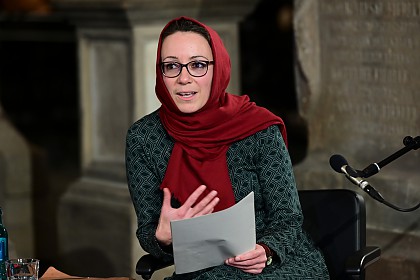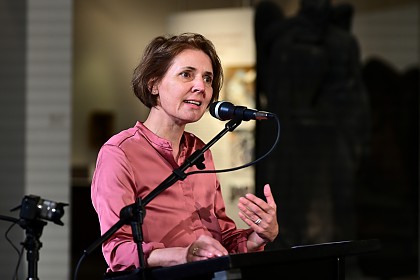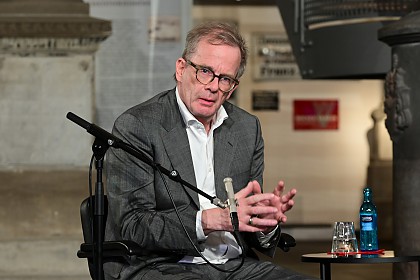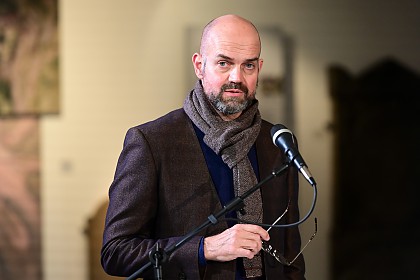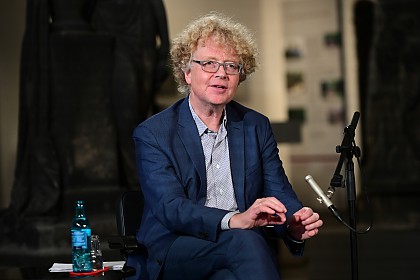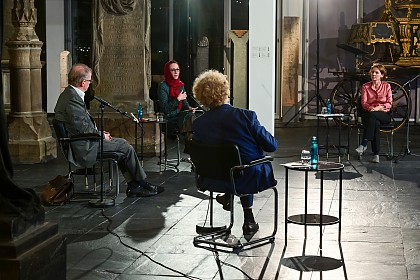

17. November 2020 | 6 pm
Livestream
Dying in Times of Covid-19
A Conversation about Cultures of Farewell between Religions and Professions
Evening Event
Museum for Sepulchral Culture Kassel | November 17, 2020, 6 – 8 pm
The Covid 19 pandemic has also changed the way people die. Although the fatal outcome of the disease – at least in Germany – was limited to a comparatively small group of people suffering from sars-CoV-2, the number of people who died from the disease was still relatively small. Nevertheless, the consequences of the strategy of physical distance, which led to an almost complete lockdown of both public and private life, were also and especially serious for the dying as well as for their families and relatives. This particularly affected those who had to die in institutions for the elderly or palliative care, often in complete isolation from their relatives. But also those relatives who could neither accompany the dying adequately nor say goodbye to them after their death, nor bury them later in the usual manner, are affected. Thus an important factor of an appropriate culture of farewell and mourning fell victim to the strict limitations imposed by Corona. The usually emotionally dense relationships between the different persons within each dying process count among those essential relationships for which the moment of tactile or at least physical presence is actually indispensable.
It is sometimes forgotten that those affected by the desth of a person also include not least the roommates and professionals of the respective institutions, who are again touched in their own unique way by the corona-conditioned circumstances of largely isolated dying. They are, so to speak, the last companions of the deceased's everyday life – in the knowledge that usually one of them follows the deceased (resident) or accompanies the dying professionally. Perhaps it is the – unusual – perspective of such members of institutions, where the majority of people die today, that illuminates the significance of dealing with the dead for the living and makes it obvious in the isolating times of Corona.
Religions have an enormous reservoir of interpretation patterns and action rituals for the phases of dying: from its beginning and the death phase to the burial and the mourning phase for the bereaved. The aim of the discussion is to explore how they are able to take up such extraordinary situations of dying or even how they are prevented from doing so themselves in their supporting rituals. The focus of this evening will be on the monotheistic-abrahamic religions.
Recording 17. November 2020
Recording and Livestream at November 17, 2020 were filmed and produced by Virtuelle Bühne Kassel e.V.
Programme
6 pm – 6:20 pm: Opening:
- Prof. Dr. Andreas Lob-Hüdepohl, Catholic Theologist, German Commission Justitia et Pax, Berlin
- Daniela Schily, General Secretary of the German War Graves Commission e.V.
6:20 pm – 7:30 pm: Round table discussion with the following participants:
- Prof. Dr. Andreas Kruse, Gerontologist, Heidelberg
- Jun.-Prof. Dr. Muna Tatari, Muslim Theologist, University of Paderborn
- Prof. Dr. Andreas Lob-Hüdepohl, Catholic Theologist, German Commission Justitia et Pax, Berlin
- Moderation: Dr. Dirk Pörschmann, Director Central Institute and Museum for Sepulchral Culture, Kassel
7:30 pm – 8 pm: Questions from the Audience
Arbeitsgemeinschaft Friedhof und Denkmal e.V.
Zentralinstitut für Sepulkralkultur
Museum für Sepulkralkultur
Weinbergstraße 25–27
D-34117 Kassel | Germany
Tel. +49 (0)561 918 93-0
info@sepulkralmuseum.de



